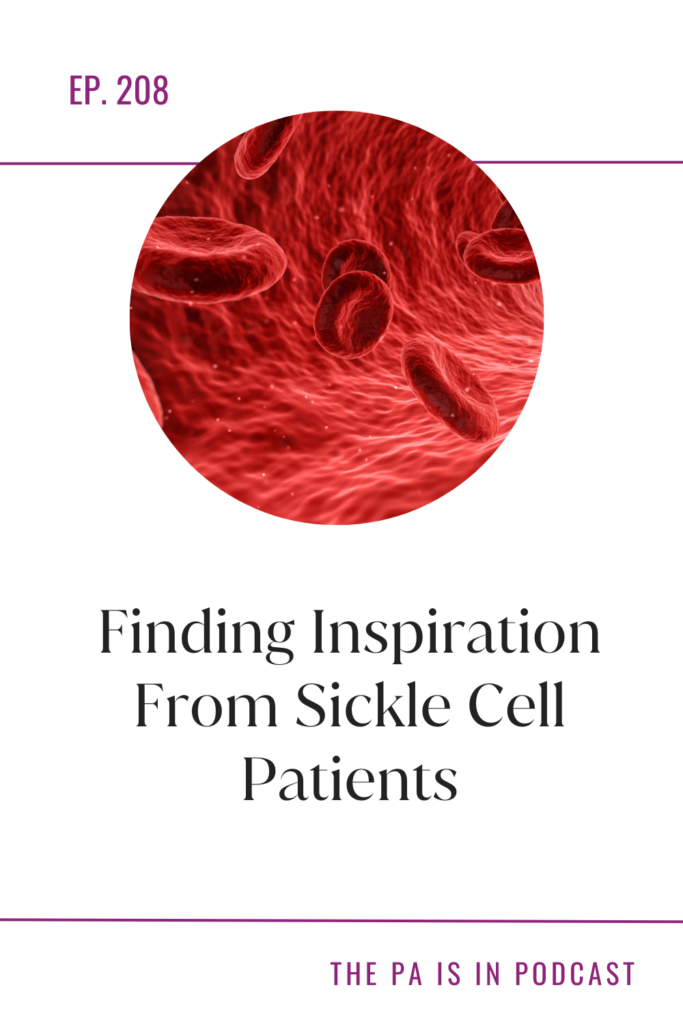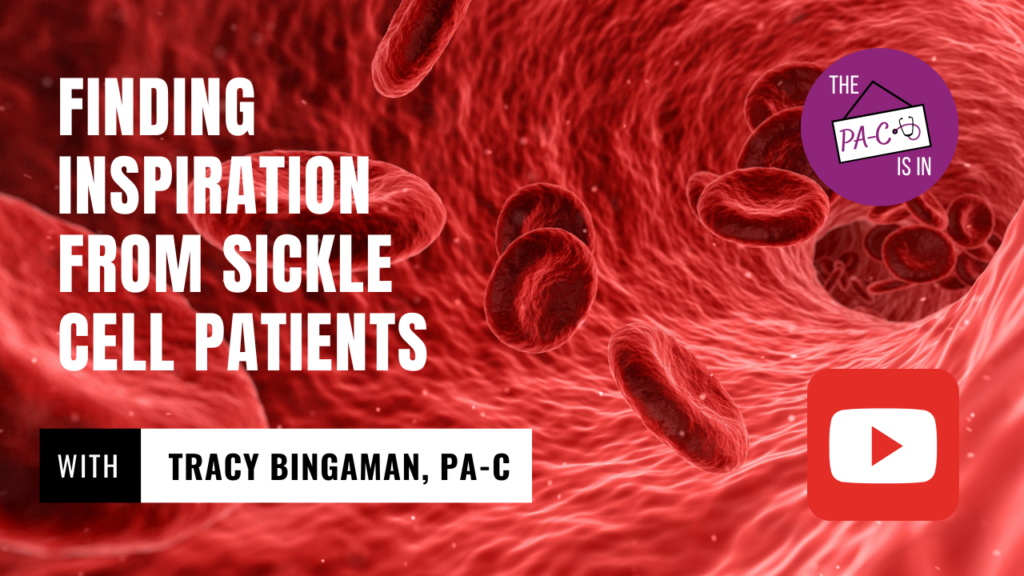
Meet Alex Cristofori
Alex is a PA at Johns Hopkins Hospital in Baltimore in the Sickle Cell Center for Adults and in the department of Hematology. He provides care in both the inpatient and outpatient settings for patients with sickle cell and other hematologic diseases. Alex grew up in northeast Connecticut in a blue collar family and is a first generation college graduate. He attended Arcadia University outside Philadelphia in the dual degree MPH/MMS Physician Assistant program. Alex has a self-described passion for equity and public health.
Listen Here
APPLE PODCASTS | SPOTIFY | STITCHER
Watch on YouTube

Growing From a New Graduate
Alex has been a PA at Hopkins in hematology, specifically sickle cell disease, for 1.5 years. Alex says that in some ways he feels like a new grad and in other ways he feels more seasoned and comfortable. He says he no longer identifies as a new grad. Alex reminisced on the process of becoming a PA – the hours required to get into school, certain credits, etc. He explained that he still feels close to that and still feels like a new PA, but after 1.5 years, he’s now getting more comfortable in the day to day regimen and role as a PA. With that increased comfort, he can now focus on new horizons and other directions.
Alex explained the transition of starting from, “How can we keep everyone alive today?” to having extra brain space and energy to think about optimizing and improving systems. It’s exciting to get to the time when you can automate the basics and run through check lists with a regimen so that you have time to listen to the news on the way to work or read a research article prior to work. It’s great to have margin for the “extra” and the “other” things.
Feeling Supported as a New Graduate
Alex described how he’s been lucky to have an observership program to help support the orientation process of his current job. Sickle cell is a niche speciality and hyper-specialized. Most PAs don’t learn a lot about sickle cell disease during their education or in previous jobs. The observership program is comparable to a fellowship with a standardized training program, shadowing and fellowship-like hours in the clinic following seasoned providers. There are also curricula from PAs/NPs to other PAs/NPs to learn more in-depth about sickle cell.
For one year, Alex rotated through all the different roles he would have as a PA in this job. There was close mentorship and great training from more seasoned PAs/NPs. He was allowed to “fly,” but still had his more seasoned colleagues as “guardrails” for extra support. In addition to the support from PAs/NPs, Alex described his attendings as fantastic.
In this job, PAs/NPs have autonomy to practice to the full limit of their scopes of practice, but the attending is still present at all times to provide a safety net and expertise. There’s a difference between autonomy and being thrown to the wolves. Autonomy is not being overworked, having too large of a patient load and not having the capacity to think deeply about patients’ problems, complex diseases and differential diagnoses. There was just enough fire to motivate Alex and enable him to learn quickly, but he never felt like he was drowning or had no one to go to for guidance and help. It’s a careful balance that a good program/employer has for a new grad coming into the field so they can grow quickly and be autonomous, but also be supported in many ways. In this way, the employer gives new employees confidence in their own competence.
Different Aspects of the Job
Alex works in the sickle cell center for adults, usually 20 years old and older. It is a PA/NP-lead program with two hematologists as the attendings, as well as two psychiatrists, social worker and other team members. The program started with two NPs and has grown to now 6 PAs/NPs.
In the outpatient setting, there is the infusion center for acute care/urgent care visits. In the infusion center, providers infuse fluids and analgesics meds (IV or PO) to patients presenting for an acute complaint.
This job also includes inpatient consults in which the team rounds on any admitted patients with sickle cell. Patients are followed daily, and providers make recommendations about pain control, imaging needs, etc.
In the outpatient chronic care clinic, standard preventative medicine is provided for patients with sickle cell disease. Each provider has one day each week to follow up with patients.
Finally, this job includes research. PAs and NPs are empowered to be involved in research and to lead their own research projects.
Resiliency is Contagious
Taking care of sickle cell patients can be very difficult, especially when they present with lots of pain and in extremis. Although it can be very challenging, Alex says that his patients’ resilience, optimism and energy is contagious.
Alex explained how he initially was intimated by the complexity and amount of pain patients have. Then he realized these patients have had this disease since the day they were born, and it has shaped their existence and approach to life. Alex encouraged the listeners to think about the weight these patients carry on their shoulders – the weight of systemic racism as well as sickle cell disease. Medical outcomes are known to be worse in many categories for black people, but to add sickle cell disease with debilitating and excruciating pain with no external objective findings to validate that pain makes medical encounters even more difficult. Patients are forced to convince providers what they’re going through, which is especially difficult when they’re black. There is significant racism in medicine. Providers don’t always take patients seriously or believe them, whether overtly or subconsciously.
Many of Alex’s young patients present in 10/10 pain, but still have the energy to ask about him and his day and his family. They truly want the answer and details. Patients will also share pictures of their own families.
Many patients have terrible experiences, but they use those to become advocates for other patients, speak on radio shows, give talks, speak with senators to advocate for certain bills or for funding for infusion centers and create nonprofits for more resources and more support for patients currently living with sickle cell disease. Patients work non-stop and have so much drive, even when their hemoglobin is in single digits and they are admitted with significant pain. Alex said if these patients have this energy and drive to make changes in medicine and in the world, he can find the time and energy to make changes, especially as a healthy, white man who is not burdened by systemic racism.
Providing Evidence-Based Care
It is important for providers to focus on harm-reduction, equity and evidence-based care. However, it is hard to find time to read and learn while also working and taking care of patients. You will constantly see new and complicated diseases wherever you work, whatever speciality you’re in.
Alex has been lucky to work with attendings who can help really teach him via data and new research and to give him seminal papers to use as self-education or reference points. Alex can also help educate residents or fellows via these papers and research. These are tools to focus your approach to treatment with strong evidence.
Unfortunately with sickle cell, there’s been limited research and poorly performed research. It’s important to have regular access to academic papers for your own learning and treatment approach and to also teach other providers. We can learn more and absorb the information better when we teach it to others, whether colleagues or patients. It’s important to understand why we do the things we do and why we choose certain treatments. Alex recommended to create a document with common “why” questions and their answers.
We are never so good at our jobs that we are able to stop learning. There are always new medications and treatments being discovered.
Benefits of a Public Health Degree
Initially, Alex received his dual degree with the idea to help inform his approach to medicine, but then he fell in love with public health and wanted it as a primary focus.
Alex explained how he is invested in healthcare disparities. He came to Hopkins to work with sickle cell disease in a field where equity is a primary concern, not a secondary one. His team is trying to make healthcare more accessible and equitable for the people they are caring for.
Alex thought his MPH would guide his focus in medicine and help him think about whole patients, but it enabled him to approach things from a research perspective and think about how we currently do things and how they can change.
In this job, PAs and NPs are involved in quality improvement projects, which Alex hopes to be involved in as well in the future.
Alex is particularly passionate about young adults with sickle cell disease and the acute increase in mortality in their 20s when they transition from pediatrics to the adult world of medicine. Alex said he has a low tolerance for young people dying, especially if it’s from a preventable cause. Not just sickle cell, but also the prevalence of gun violence and how that directly and indirectly affects young adults.
PA/NP-lead initiatives are exciting at Hopkins. Two current initiatives involve buprenorphine and ketamine. Buprenorphine is revolutionary for sickle cell disease. This initiative is looking at how effective it can be for patients, particularly with buprenorphine micro inductions. There is also interest in ketamine and its synergy with full agonist opioids for treatment of both sickle cell pain and also pain in general.
Guiding the Next Generation
Towards the end of Alex’s PA program, a panel spoke about how they use both their PA and MPH degrees. The panel included a PA from Hopkins who spoke about founding a sickle cell center and all the incredible things they had been doing. She was a clear advocate for her patients and also a passionate, incredible provider using her full scope of practice and involved in research. Alex was excited by that and thought it sounded like the place he wanted to be.
After the panel discussion, Alex connected with that PA on LinkedIn to thank her for speaking. The conversation expanded to Alex coming to see the center and learn about the observership. He thought it was a perfect fit for his thesis on buprenorphine as well as his interest in healthcare equity and in using his full scope of practice as a PA with appropriate compensation.
This is a good reminder to everyone listening that if you see someone doing something cool, reach out to them to thank them and congratulate them on what they’re doing, as well as to connect with them and to learn how you can do those things, too. Don’t be afraid to reach out – there’s no downside to cold emails or cold online messages. It will create a connection that will be useful in the future. The world is smaller than you think it is, especially as a PA or NP.
You can connect with Alex via LinkedIn or email. He is especially happy to speak with new grads.